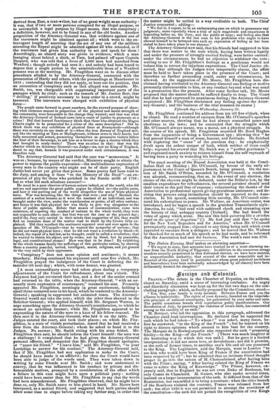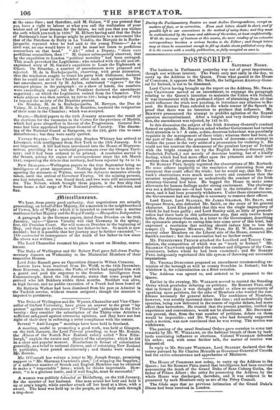gore* anb Colonial.
FRANCE.—The debate in the Chamber of Deputies, on the address, closed on Saturday, amid a scene of increasing confusion. An angry and disorderly discussion was kept up for the last two days on the con- cluding paragraph ; which, as finally proposed by the Committee, stood— "Yea, Sire, your family is truly national. Between France and you the alliance is indissoluble. The rights of your dynasty, founded on the imperish- able principle of national sovereignty, are guaranteed by your oaths and ours. The public conscience brands with reprobation guilty manifestations. Our Revolution of July, by punishing the violation of sworn faith, has consecrated among us the sanctity of an oath." M. Berryer, who led the opposition to this paragraph, addressed the Chamber amid load interruptions. He declared that he re,spected the oath which he had taken—" TO whom ?" was asked, many times, be- fore he answered, "to the King of the French " ; but he insisted on his right to discuss opinions which seemed to him best for the country. The Marquis de la Rochejacquelin also respected the oath "promising fidelity—to the King—of the French." [There was much laughter at the hesitating way in which this was said.] But he gave it a limited interpretation : it did not mean love, or devotedness ; nor did it promise, as the oath of former times, to sacrifice one's life and all one possessed to the King. The Legitimists, said the Marquis, went to London "to see him who would have been King of France if the constitution had been respected by all "; but he admitted that an intimate friend thought proper to go into the saloon of M. Chateaubriand, after having been with the Prince' saying, "After having saluted the King of France we come to salute the King of Knowledge." The Prince, however, ex- pressly said, that in England he was not even Duke of Bordeaux, but only Comte de Chambord. M. Guizot, who also spoke several times, insisted on a larger interpretation of the oath. It differed from that of the Restoration but resembled it in being a contract : when the elder branch of the Bourbons violated the contract, France was released from her oath ; but after 1830 it was not permitted to attempt the overthrow of the constittition—the oath did not permit the recognition of two Kings at the same time ; and •therefoie, said M. Guizot, " if you pretend that you have a right to labour at what you call the realization of your wishes and of your dreams for the future, we tell you that you violate the oath which you took in 1830." M. Hebert having said that the Duke of Bordeaux's tour in Europe might be preliminary to a movement like that of the Dutchess de Berry in La Vendee, the Marquis de is Roche- jacquelin repeated what he had said to the young Prince—" As to civil war, no one would have it ; and he must not listen to perfidious counsellors on that head." " Ah I" cried a Deputy, "there were perfidious counsellors, then 1" M. Guizot subsequently observed, that by the expedition to London "political morality" had been outraged. This much provoked the Legitimists; who retorted with the old and oft- explained story of M. Guizot's expedition to Louis the Eighteenth at Ghent. On Saturday, a number of amendments were proposed and rejected. M. de la Rochejacquelin, observing, with great animation, that the resolution sought to brand his party with dishonour, declared that he could not sit in the Chamber after such an explanation. The last amendment, moved by N. Aylies, substituted " reprove " for the stronger phrase in the paragraph : on a show of hands, the numbers were exceedingly equal ; but the President declared the amendment negatived ; on which the Legitimists retired from the Chamber. The whole address was then carried, by 220 to 190; being a majority of only 14 beyond the moiety of the Deputies present.
On Monday, M. de la Rochejacquelin, M. Berryer, the Duc de Valmy, N. le Leray, and M. Blin de Bourdon, tendered the resignation of their seats in the Chamber; which was accepted.
SPAIN.—Madrid papers to the 24th January announce the result of the elections for the vacancies in the Cones for the province of Madrid, which had gone altogether in favour of the Progresistas. General Ser- rano had been appointed Inspector-General of Cavalry. The disarm- ing of the National Guard at Saragossa, on the 22d, gave rise to some disturbances ; but they were easily quelled.
UNITED STATES.—The packet-ship Stephen Whitney has arrived at Liverpool, with intelligence from New York to the 13th January. It is not important. A bill had been introduced into the House of Represen- tatives, providing for a territorial government over the Oregon Terri- tory; and it had been ordered to be printed. A resolution moved in the Senate, asking for copies of correspondence since the 4th March 1841, respecting the title to that territory, had been rejected by 34 to 14.
NEW ZEALAND.—Wellington papers to the 21st September bring no intelligence of great importance. Nothing further was to be done re- specting the massacre at Wairao, except the defensive measures already taken, until the arrival of Governor Fitzroy. Of the missing persons, one had returned, one was found dead, and two were still unaccounted for. The Nelson, which brought these papers, is the first ship that bears home a full cargo of New Zealand produce—oil, whalebone, and flax.



























 Previous page
Previous page